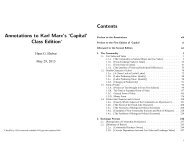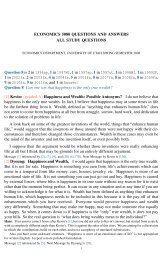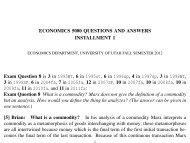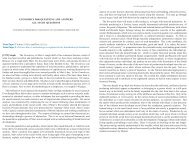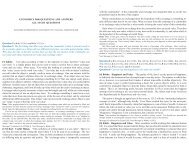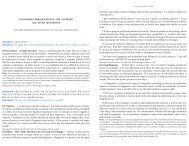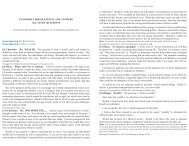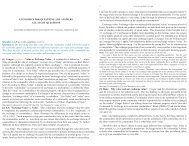Question 1 What did Marx mean with his formu - University of Utah
Question 1 What did Marx mean with his formu - University of Utah
Question 1 What did Marx mean with his formu - University of Utah
Create successful ePaper yourself
Turn your PDF publications into a flip-book with our unique Google optimized e-Paper software.
U <strong>of</strong> <strong>Utah</strong> Econ 5080 2005fa 31<br />
person wanted to get a corn, in t<strong>his</strong> case, they exchanged cow <strong>with</strong> corn. Each <strong>of</strong> them has a<br />
greater utility and happier when exchanging cow by corn.<br />
Finally, I believe that exchange-value <strong>of</strong> a commodity should not be derived from its usevalues<br />
as <strong>Marx</strong> put it. We could know that what <strong>Marx</strong> <strong>mean</strong>t by saying “accidental” and<br />
“Purely relative” have something to do <strong>with</strong> huge number <strong>of</strong> forces in the market conditions.<br />
Hans: You seem to have language difficulties which prevent you from understanding the question asked. T<strong>his</strong> is<br />
also true for your [158].<br />
Next Message by Mjk is [158].<br />
<strong>Question</strong> 55 is 47 in 2001fa, 48 in 2002fa, 50 in 2003fa, 55 in 2004fa, 66 in 2007SP, 66<br />
in 2007fa, 67 in 2008fa, 69 in 2009fa, 70 in 2010fa, and 77 in 2012fa:<br />
<strong>Question</strong> 55 Why does <strong>Marx</strong> write in 127:1 “the valid exchange-values,” instead <strong>of</strong> simply<br />
“the exchange-values”?<br />
[36] Thugtorious: content A form 90% (As Submitted:) The answer to t<strong>his</strong><br />
Use-values which affect the relations <strong>of</strong> question is relatively simple, and explained<br />
production. The answer to t<strong>his</strong> question is very thoroughly by both <strong>Marx</strong> and Hans.<br />
<strong>Marx</strong> says “the valid exchange-values” instead<br />
<strong>of</strong> just “exchange values” in t<strong>his</strong> pas-<br />
relatively simple, and explained very thorsage because there are enumerated exchangeoughly<br />
by both <strong>Marx</strong> and Hans. <strong>Marx</strong> says values for one commodity, not just one<br />
set quantitative amount for which it is ex-<br />
“the valid exchange-values” instead <strong>of</strong> just changed. The example given is “one-quarter<br />
<strong>of</strong> wheat” has an exchange-value equiva-<br />
“exchange values” in t<strong>his</strong> passage because lent to x amount <strong>of</strong> shoe polish, y amount<br />
<strong>of</strong> silk, and z amount <strong>of</strong> gold; all qualita-<br />
there are numerous exchange-values for a tively different amounts <strong>with</strong> one-quarter <strong>of</strong><br />
given commodity, not just one set quantita- wheat remaining the same. They are all intive<br />
amount for which it is exchanged. The<br />
example given, one-quarter <strong>of</strong> wheat, has<br />
an exchange-value equivalent to x amount<br />
<strong>of</strong> shoe polish, y amount <strong>of</strong> silk, and z<br />
amount <strong>of</strong> gold; all qualitatively different<br />
amounts <strong>with</strong> one-quarter <strong>of</strong> wheat remaining<br />
the same. They are all interchangeable<br />
<strong>with</strong> each other.<br />
terchangable <strong>with</strong> each other.<br />
I believe that <strong>Marx</strong> was very careful in<br />
<strong>his</strong> word selection while writing Das Kapital,<br />
and t<strong>his</strong> is a prime example. If he would<br />
I believe that <strong>Marx</strong> was very careful in have wrote simply “exchange values,” a lay-<br />
<strong>his</strong> word selection while writing Das Kapmen reader might interpret that as one quanital,<br />
and t<strong>his</strong> is a prime example. If he titative amount that defines a commodities<br />
would have written simply “exchange val- exchange value regardless <strong>of</strong> the commodues,”<br />
a layperson reader might interpret that ity <strong>with</strong> which it is to be traded. However,<br />
as one quantitative amount that defines a <strong>with</strong> t<strong>his</strong> foresight, he chose to write “all<br />
32 2005fa Econ 5080 U <strong>of</strong> <strong>Utah</strong><br />
valid exchange values” because he recog-<br />
commodity’s exchange value regardless <strong>of</strong> nized the possible misinterpretation. Each<br />
the commodity <strong>with</strong> which it is to be traded. <strong>of</strong> the previously mentioned commodities<br />
are all traded at differing amounts for a quar-<br />
However, <strong>with</strong> t<strong>his</strong> foresight, he chose to ter <strong>of</strong> wheat, but they are all the same in<br />
write “all valid exchange values” because he magnitude. As Hans says: they represent<br />
recognized the possible misinterpretation. “all the other exchanges that would have<br />
Each <strong>of</strong> the previously mentioned commodi- been possible but <strong>did</strong> not happen” (Hans, p<br />
ties are all traded at differing amounts for a 51).<br />
quarter <strong>of</strong> wheat, but they are all the same<br />
in magnitude. As Hans says: they represent<br />
“all the other exchanges that would have<br />
been possible but <strong>did</strong> not happen” (Hans, p<br />
51).<br />
Hans: <strong>Marx</strong> <strong>did</strong> not explain thoroughly what the <strong>formu</strong>lation “valid” <strong>mean</strong>s; and my interpretation in the Annotations<br />
is only one <strong>of</strong> many possibilities. Now I am inclined to think that <strong>Marx</strong> threw the adjective “valid” into<br />
t<strong>his</strong> sentence to emphasize that these exchange-values are a social expression <strong>of</strong> something despite the fact that the<br />
individual traders do not choose them, but they are given to them by the market. These are the exchange proportions<br />
which they find as the valid market proportions.<br />
A few editorial corrections were necessary to make your text acceptable. Only small things, nothing which you<br />
couldn’t have done yourself. My edited version is in the left column, and your original in the right. I subtracted 10<br />
percent from the grade point number for the formal flaws <strong>of</strong> your answer; i.e. your grade point is not 4.0 but 3.6.<br />
Message [36] referenced by [2007SP:282]. Next Message by Thugtorious is [37].<br />
<strong>Question</strong> 56 is 277 in 1996sp, 67 in 2007fa, 68 in 2008SP, 68 in 2008fa, 71 in 2009fa,<br />
and 72 in 2010fa:<br />
<strong>Question</strong> 56 First give <strong>Marx</strong>’s arguments how one can come to the conclusion that exchangevalue<br />
is not something inherent in the commodity. Then reproduce, in your own words,<br />
<strong>Marx</strong>’s rebuttal that, despite these arguments, exchange-value seems to be something inherent<br />
to the commodity after all.<br />
[62] Kowski: graded A Exchange Value. <strong>Marx</strong> describes how one could conclude that<br />
exchange value is not an inherent characteristic <strong>of</strong> a commodity. Because goods can be exchanged<br />
at varying amounts, times, and places — things that are external to the commodity<br />
itself and are constantly changing, — the exchange value seems to come from these external<br />
conditions <strong>of</strong> the exchanges and are, as <strong>Marx</strong> puts it, ‘accidental’ and ‘purely relative’.<br />
While it is easy to understand how one can reach the conclusion that exchange value is not<br />
an intrinsic characteristic <strong>of</strong> a commodity based on these arguments, <strong>Marx</strong> counters <strong>with</strong><br />
another argument claiming that exchange value is actually inherent in a commodity. Every<br />
transaction that takes place trades an amount <strong>of</strong> something for an amount <strong>of</strong> something<br />
else. While the amounts <strong>of</strong> each good are different, they are equal in worth. T<strong>his</strong> equality<br />
in worth depending on the goods being traded shows that the exchange value is inherent in<br />
each commodity. The exchange value cannot be expressed unless the commodity is known,<br />
thus it is inherent.<br />
Hans: Excellent answer.<br />
<strong>Question</strong> 57 is 68 in 2007fa and 69 in 2008fa:



